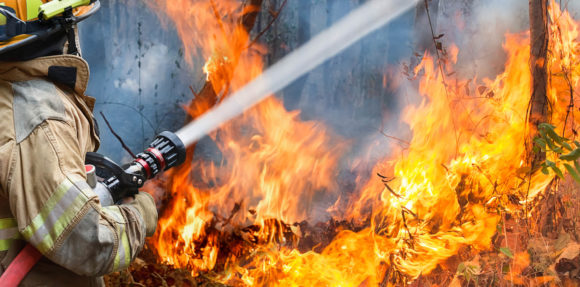Rains may bring some reprieve to those suffering from massive blazes in the Pacific Northwest in the next few weeks, but forecasters don’t expect any help for wildfire-plagued California anytime soon.
That’s according to briefing call on Friday morning held by AccuWeather and Plume Labs looking at weather and air quality forecasts for the remainder of this year’s wildfire season.
Residents in the Golden State have been living for weeks with grayish, choking air and widespread ash from North to South, with numerous lives lost and thousands of evacuations, while hundreds of thousands have been on evacuation alerts in Washington and Oregon from numerous wildfires.
The record-breaking fire season has already resulted in unhealthy air quality in the Western U.S., with smoke making it all the way across the country and possibly headed into Europe. Economic losses from the fires are expected to be between $130 billion and $150 billion, according to AccuWeather. Those losses include destroyed property and structures, firefighting costs, and anticipated health issues from the smoke.
“There were some days we had several hundred thousand acres burned in one day,” said David Samuhel, a senior meteorologist at AccuWeather.
Dozens of wildfires raging in California, Oregon, Washington and other Western states have resulted in loss of life, with 9,657 homes and commercial structures damaged or destroyed and millions of acres burned, according to the National Interagency Coordination Center.
Moody’s this week estimated that 2020 is already the third-highest year for California insured wildfire losses after 2018 and 2017.
In 2017, property/casualty insurance losses from major October and December California wildfires that year totaled about $12 billion, which was surpassed by $13 billion of losses in 2018.
California insured losses would be about $4.8 billion so far assuming CAL FIRE’s estimate of about 5,792 structures destroyed or damaged, and an average historic value of about $826,000 per structure, according to Moody’s.
Also on the AccuWeather briefing was Dr. Boris Quennehen, who leads the atmospheric science team at air quality research leader Plume Labs.
According to Plume, which issues a global air index, the air quality in the areas around the fire is rated at 800 on its index. For comparison, “very bad days” in Los Angeles, San Francisco and Portland would measure at 100 on the index.
“Five of the 10 largest fires in California history are currently burning right now,” Quennehen said.
A Pacific tropical storm in August caused numerous lighting strikes in Northern California, causing many of the ongoing fires in that area, while wind events followed and worsened conditions, according to Samuhel.
A high pressure system last week sent wind gusts from Colorado to the Pacific Ocean, increasing fire activity in Washington, Oregon and California.
“As of yesterday we’ve seen about 7 million acres burned,” Samuhel said.
The Washington, Oregon and surrounding states may expect a break with storms out on the horizon.
“Going forward in the next few weeks we will see some rain in the Pacific Northwest,” Samuhel said.
However, no rain is expected anytime soon for California, he said, adding “So that’s going to be a ground zero for extreme fire weather in the next few weeks.”
CalFire’s daily fire report shows more than 17,400 firefighters on the frontlines of more than 26 major wildfires in California.
Progress was made on a number of fires, but several others saw growth due to increased fire behavior and firing operations, according to CalFire.
“Since the beginning of the year, there have been nearly 7,900 wildfires that have burned over 3.4 million acres in California,” the CalFire report states. “Since Aug. 15, when California’s fire activity elevated, there have been 25 fatalities and nearly 5,400 structures destroyed.”
Related:
Was this article valuable?
Here are more articles you may enjoy.



 California Chiropractor Sentenced to 54 Years for $150M Workers’ Comp Scheme
California Chiropractor Sentenced to 54 Years for $150M Workers’ Comp Scheme  Allstate Reports $731M in Q1 Pretax Catastrophe Losses
Allstate Reports $731M in Q1 Pretax Catastrophe Losses  Former MLB Player, 3 Others Charged with Staging Auto Accident in Miami
Former MLB Player, 3 Others Charged with Staging Auto Accident in Miami  AIG Sues Newly Launched Dellwood Insurance and Its Founders
AIG Sues Newly Launched Dellwood Insurance and Its Founders 

